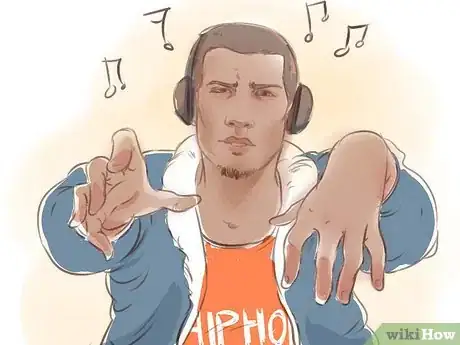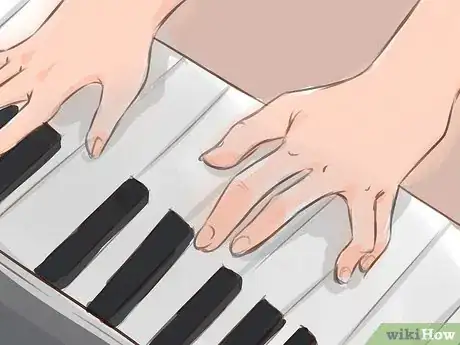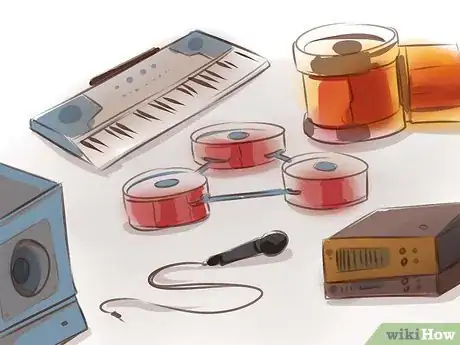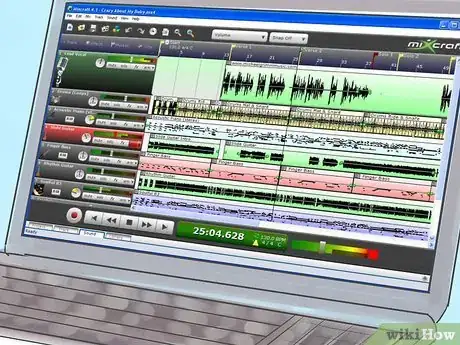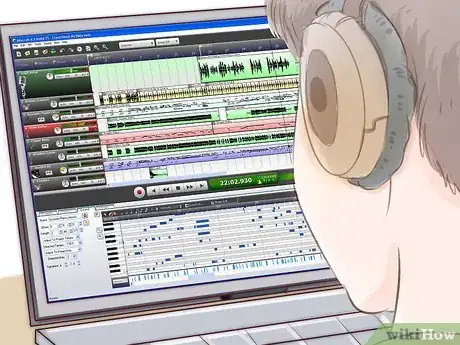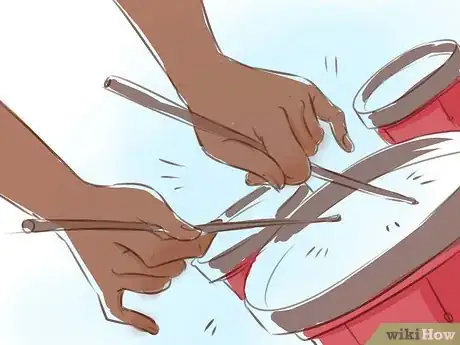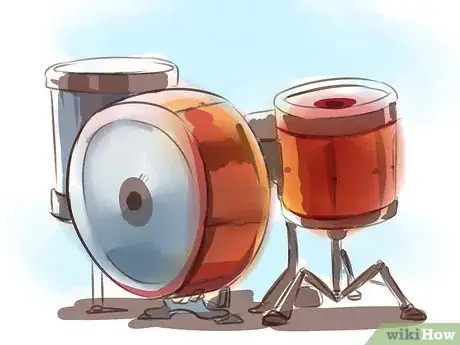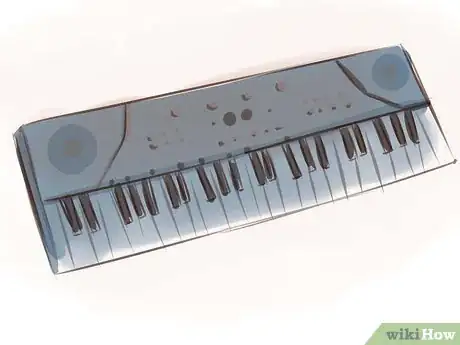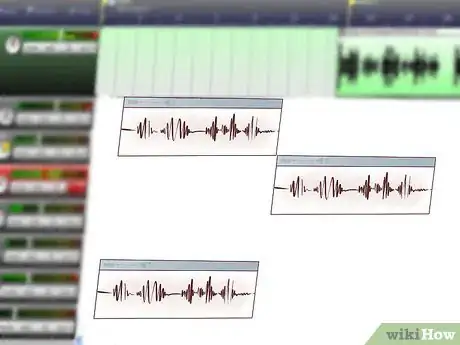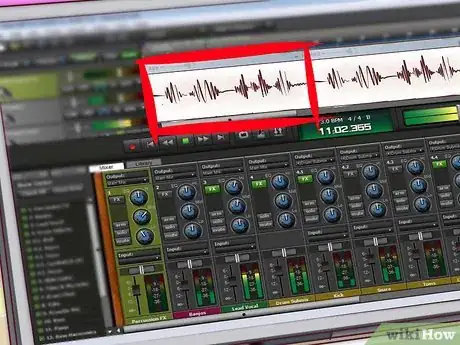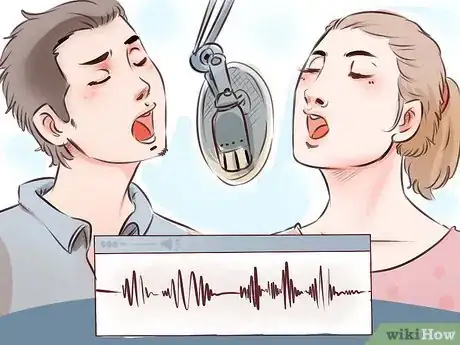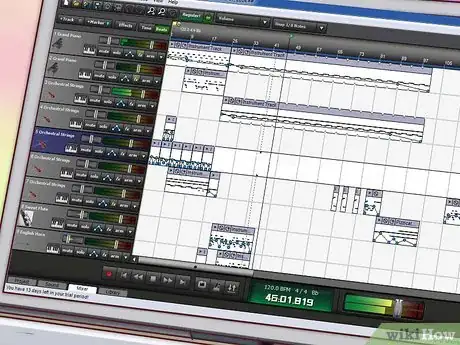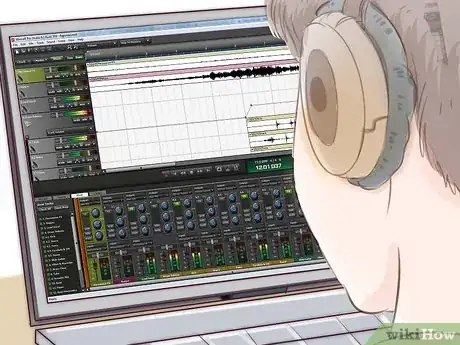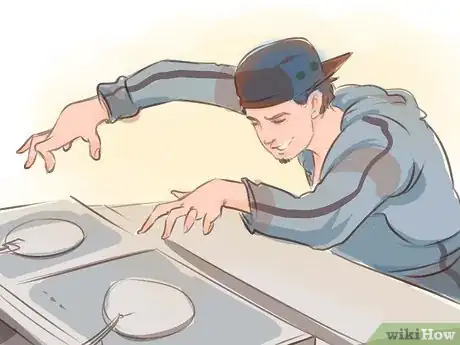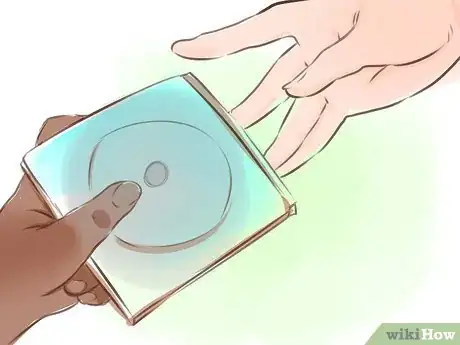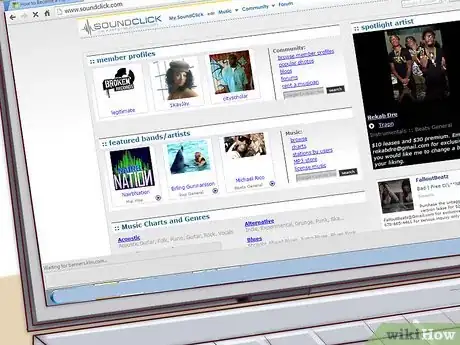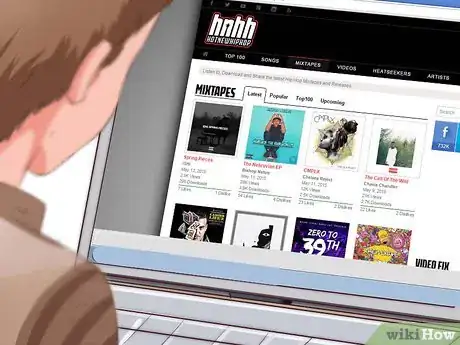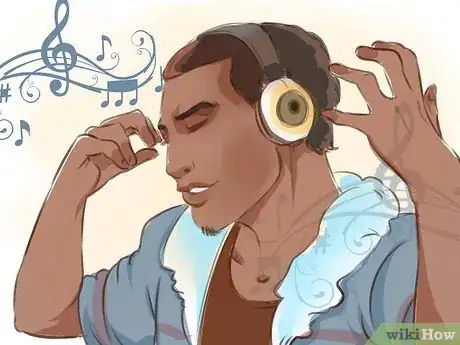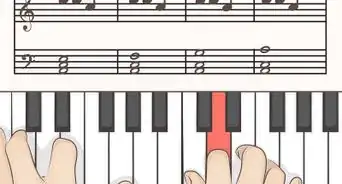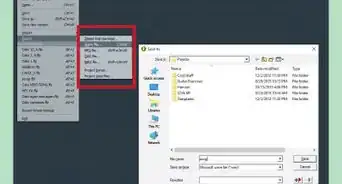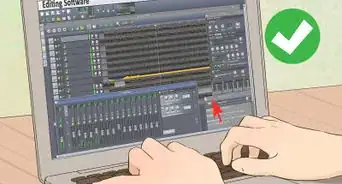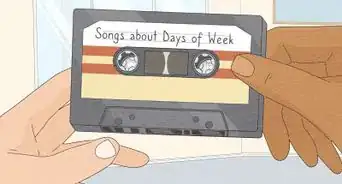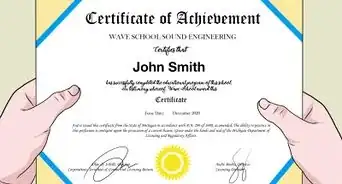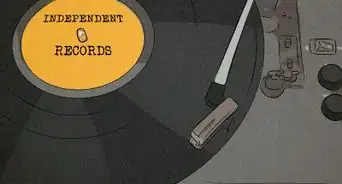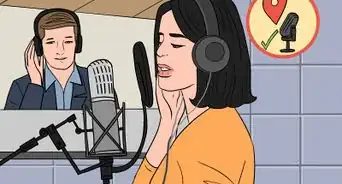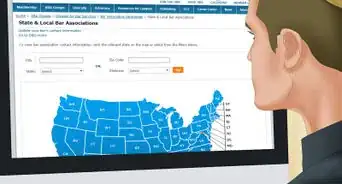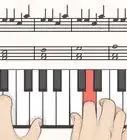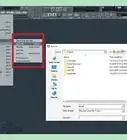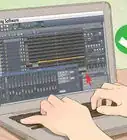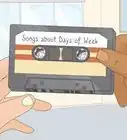wikiHow is a “wiki,” similar to Wikipedia, which means that many of our articles are co-written by multiple authors. To create this article, 55 people, some anonymous, worked to edit and improve it over time.
There are 12 references cited in this article, which can be found at the bottom of the page.
wikiHow marks an article as reader-approved once it receives enough positive feedback. This article received 16 testimonials and 91% of readers who voted found it helpful, earning it our reader-approved status.
This article has been viewed 349,511 times.
Learn more...
While rappers often get the fame and credit, producers are the heart and soul of hip-hop. Producers make the instrumental "beats" that rappers need in order to be heard, crafting the hooks, melodies, and rhythms that the world loves to listen to. There are many types of producers and an infinite number of styles to try, but there are a few common steps that every producer shares.
Steps
Learning The Craft
-
1Fall in love with hip-hop. Know before you begin that the music industry is notoriously difficult to break into, so you need to be pursuing hip-hop because you love it, not to make a quick buck. Listen to as many rappers and producers as you can, discovering what sounds you love and what style of music you want to make. The more you know about hip-hop, the better equipped you will be to make it.
- Hip-hop is one of the easiest genres to get into, thanks to the wide variety of free music available at mixtape websites like Datpiff, LiveMixtapes, and HotNewHipHop.
-
2Listen to a wide array of music. Hip-hop producers are famous for pulling diverse musical influences and trends together to create something new, so look for good music wherever you can find it. RZA and got famous digging through old soul albums, Russell Simmons and Rick Rubin made waves bringing rock & roll into rap, and Kanye uses a full classical orchestra behind many of his beats. There is no genre that you cannot find inspiration in as a hip-hop producer.
- Listen to music for its quality, not because of its genre or reputation.
- Keep notes of music you like so you can find it, and potentially use it, later.
Advertisement -
3Learn music theory and history. Production is the process of creating an instrumental track, but in the case of hip-hop, you will usually be "playing" all of the instruments. To have full control over your sound you need to know how music works, including time signatures, chord progression, music theory, and instrumentation. [1]
- Learn how to play an instrument. Since many beats are made with a keyboard, try starting with a piano.
-
4Buy beat-making equipment. Hip-hop has a low barrier to entry because you can theoretically make beats with nothing more than a reasonably powerful computer. These days, extra tools can plug right into your computer to give you even greater control over your music, however, and are nearly invaluable.
- Keyboards: Perhaps the second most important tool next to a computer, keyboards allow you to create your own melodies and physically play your beat, which is usually much faster than inputting the notes into the computer.
- Drum Machines: incredibly versatile rhythm instruments, drum machines let you assign any sound you want to a small pad then play that sound as if it was a drum. You can program it with drums, cymbals, percussion instruments, notes, or even random sounds.
- Microphone: Essential if you want to record vocal tracks, microphones also let you record other instruments and sounds to incorporate into your beats.
- MIDI Controllers: Complex but powerful, MIDI controllers give you the ability to adjust tone, rhythm, loops, drums, and beats with the touch of a button. Many high-end keyboards and drum machines come with attached MIDI Controllers.
- Speakers: Be sure to invest in good speakers so you can hear your music at the highest possible quality, that way you can be sure your listeners are hearing what you want them to hear. [2]
-
5Choose audio production software. Known as a Digital Audio Workstation (DAW), there are hundreds of options out there. While there is a lot of variability in features, usability, and reliability, most of them are pretty similar in execution. Different instrument parts are dragged into a timeline where they can be layered, edited, and repeated to form your song. Choose the program you are most comfortable with and learn everything you can about it.
- Some free programs to begin practicing on are Audacity, GarageBand (Mac), Cecilia, and Mixx.
- For more committed beatmakers, check out paid programs like Pro Tools, Logic, MuTools, MixCraft, or Cubase.
- Every software has tons of tutorials, tips, and tricks available online, and you should learn as much about your DAW as you possibly can.
-
6Experiment with sounds and equipment. This is the only way to get familiar with your equipment and to learn what kind of music you'd like to make. Make as many beats as you can, even if they are only 30 seconds long, and dig into all of the instruments you have access to.
- Try recreating some of your favorite beats. You can download packs of sounds that famous producers use online and play with them to see how they're used.
Building Beats
-
1Design the drum beat first. The drums are the most important part of your beat and form the structure to the entire song. Especially in hip-hop, where singers need a steady rhythm to rap over, you need to create a solid foundation for melody, vocals, and orchestration.
- Start with the classic trio of drum beats -- kick drum, snare, and hi-hat. Play with these three drums to produce the bouncy, up-tempo feel of classic rap and hip-hop songs. Ex. DJ Premier's famous beats on the album Step in the Arena. [3]
- Download free drum packs online to find unique percussion and sounds the incorporate into your songs.
- Experiment with other sounds for percussion. Producers such as J Dilla (Ex. "Waves") became famous for using voices, sirens, pops, and other noises in place of drums. (Ex. 50 Cent's "Heat" uses gun noises for percussion)
-
2Build in a bass line. Hip-hop has its roots in jazz, funk, and soul, and just like the genres that spawned it, all hip-hop tracks require two basic instruments: drums and bass. A bass line gives your song a basic template for the melody
- Bass lines can be a simple, like Nas' "Memory Lane (Sittin' in the Park)," or complex, like Common's "Be (Intro)."
- Practice meshing the bass line with your kick drum, as they both emit low frequency notes. Layer them so you can hear both, like in the songs above. [4]
-
3Add in orchestration and melody instruments. Once you've established the "groove" of the song with bass and drums, it's time to make it really shine. This is where you get to design the feel of a song. If you want an RnB inspired song, for example, you'll want piano, some horns, and maybe some jazzy guitar (Ex. Blues Scholars "The Ave"). If you want an epic, cinematic song you'll be adding strings, tubas, gongs, etc (Ex. Big Boi's "General Patton").
- Play around with sounds constantly-- the only way to find out what sounds best is to try out as many different orchestrations as possible. [5]
-
4Learn how to loop. Looping is when you take several bars of music and repeat throughout a song so it sounds like someone is playing the part the entire time. It allows you to create a consistent beat for the MC to rap over and keeps you from tediously writing out the same part over and over again.
- The best loops are seamless. That is, it is impossible to tell that the part was essentially copy and pasted together.
-
5Learn how to sample. Sampling is when you splice bit of other songs into your song, using the old part to create something entirely new. Sampling is one of the building blocks of hip-hop producing, but you should always do it with caution -- sampling without permission can be illegal.
- Use sample sparingly, finding 2-3 notes that you like and distorting them, repeating them, or chopping them up into something new. [6]
-
6Add the vocals. Whether you do them yourself or have someone else rapping, record the vocals to your song and tinker with the length, chorus placement, and any intros or outros you want.
-
7Finish the songs with accents, beat drops, and surprise. Use your producing skills to mesh the lyrics with the beat. For example, at a moment when the lyrics reference the police, it is common to put a siren sound in the song. When you hear particularly powerful lines or rhythms, considering muting the beat so that listeners can hear the rapper clearly, then jumping back in as a surprise.
- Build up the beat-- start the song with just drums and bass, and add an instrument each verse, then break it down in the outro (Ex. Outkast's "Slump")
- Add subtle accents -- even noises that are hard to hear can give the song depth. [7]
-
8Refine your beats. Read your software manual and learn about EQ, effects and quantization, and use them where necessary.
- EQ: Also known as equalization, this is where you adjust the volume, frequency, and sounds of the entire song so that all the parts fit smoothly together.
- Effects: There are endless effects, all of which adjust or alter the sound of an instrument to make it fit the mood of the song. They can create echoes, change tones, subtly adjust notes, and much more. They are never permanent, so test them out on every instrument.
- Quantization: The art of taking hand-made notes or beats and electronically lining them up with the beat. Quantization is crucial to make a song sound clean and professional, but overdoing it may make a song seem robotic and bland. [8]
-
9Break all the rules. The best hip-hop producers forged their own path, learning from the masters while trying things no one else has. Make a song without drums, sample from a polka tune, or use a live band to make your tracks. Follow your creative instincts and keep your ears open to stand out as a producer. [9]
Becoming a Professional Producer
-
1Share your beats with people. If you want to become a professional, you have to start sharing your songs with friends, family, and strangers. This can be scary, but just remember that music is meant to be shared, and is more fun with other people.
- Start with close friends and family members so you feel comfortable with feedback.
- Never let anyone tell you that "you can't make music." If this is your dream, keep practicing and trying.
- Put your music online for instant feedback and listeners. Youtube, SoundCloud, Reddit, ReverbNation--the opportunities to share your talent are endless!
-
2Promote yourself. Once you've got other people nodding their heads to your music, start promoting yourself. Sites such as rocbattle.com, soundclick.com, givemebeats.net, and cdbaby.com are made to promote young producers.
- Become active on social media to tap into the largest market you possibly can.
- Attend hip-hop shows and network with local musicians and producers. [10]
-
3Collaborate with other rappers and producers. Part of the beauty of hip-hop is how collaborative it is. Producers and rappers mix and match regularly, finding new inspiration from other musicians and helping each other gain notoriety.
- Ask rappers you know if you can produce a song for them.
- Offer your beats online, hip-hop forums from Reddit to DatPiff are full of rappers looking for a beat to rap over. [11]
-
4Produce a mixtape. Mixtapes are free albums posted online that act as resumes for the hip-hop community. Even if you cannot get a rapper to give you vocals, put together a collection of songs that people can download and share.
-
5Keep making beats. Kanye West famously proclaimed that he produced "five beats a day for three summers," but that is what it took to break into the industry. [12] Only those that practice every day, make beats for anyone who asks, and constantly learn new tricks will become successful hip-hop producers. Even if you only want to produce for fun, you'll find the only way to really become a hip-hop producer is to produce some hip-hop.
Community Q&A
-
QuestionHow many years of college do I need to attend to become a hip hop producer?
 Community AnswerNone. College is good to learn composition, performance, engineering, business and music theory, but even then, you can learn those on your own via or even pick up a music tutor to teach you. All you need is a good ear, motivation to learn, and inspiration to create.
Community AnswerNone. College is good to learn composition, performance, engineering, business and music theory, but even then, you can learn those on your own via or even pick up a music tutor to teach you. All you need is a good ear, motivation to learn, and inspiration to create. -
QuestionWhat are some good music programs I can use on my computer?
 Community AnswerTry FL Studio. You can also use other DAWs, such as Ableton Live, Mixcraft, Logic Pro X, and many more. Check the specs of other DAWs to be sure they do what you want them to do.
Community AnswerTry FL Studio. You can also use other DAWs, such as Ableton Live, Mixcraft, Logic Pro X, and many more. Check the specs of other DAWs to be sure they do what you want them to do. -
QuestionDo I need to buy a mixer or anything like that?
 Community AnswerNo, it's not required. In theory all you need is a computer and software, but if you're looking to become professional then invest in things such as a mixer or midi keyboard or drum pad.
Community AnswerNo, it's not required. In theory all you need is a computer and software, but if you're looking to become professional then invest in things such as a mixer or midi keyboard or drum pad.
Warnings
- Don't expect to make a living out of this unless you are willing to work the hardest you have ever worked in your life. It's not an easy market to enter into unless you are very determined and will not give up easily. Remember, you might just make it---it is a crowded market.⧼thumbs_response⧽
- Don't get discouraged by critics.⧼thumbs_response⧽
- The software for FL Studio is nearly 200MB, but it is well worth the price. An outstanding program, especially for creative users. You can develop your skills to make a sturdy tool out of it⧼thumbs_response⧽
- Do not ask a question about how to do something without reading the manual or searching the internet first. Hip hop producers will be very helpful if you follow this one rule.⧼thumbs_response⧽
- Don't use abusive language. It should be avoided at all costs.⧼thumbs_response⧽
- Keep at it. If you are sure this is a passion you wish to develop, then make a way to integrate it into your life until it is mature enough to be where you want it.⧼thumbs_response⧽
Things You'll Need
- Any production software (FL Studio, Reason, Ableton, Logic, Cubase) or hardware (MIDI keyboard, Akai MPC, Audio Interface)
- A manual for above product that you've read at least twice
- Music. Lots of it. Which you know by heart.
- A Hip Hop Production Course: [1]
- Studio monitor speakers and headphones are a must. As they let you hear a sound or instrument as it actually is. Other speakers can give you a distorted version.
- Although some production course training would be good, it's not necessary. You can learn a great deal from experimentation and free videos on the internet. Above all, practice makes perfect.
References
- ↑ https://hiphopdx.com/news/id.15988/title.the-rza-talks-sampling-versus-live-instrumentation
- ↑ http://lifehacker.com/the-basics-of-music-production-lesson-1-set-up-your-h-499088482
- ↑ http://www.makebeatsforever.com/the-ultimate-guide-on-how-to-make-rap-beats/
- ↑ http://www.musicthinktank.com/mtt-open/how-to-get-your-bass-line-and-kick-drum-to-work-together.html
- ↑ http://tweakheadz.com/hip-hop-beat-construction-made-easy-the-elements-of-a-beat-arranging-beats-orchestrating-beats-sound-creation-and-production-tips-for-hip-hop/
- ↑ http://www.instructables.com/id/How-to-make-a-soul-sample-hip-hop-beat/
- ↑ http://www.musicradar.com/us/tuition/tech/10-hip-hop-production-tips-431654#null
- ↑ http://www.soundonsound.com/sos/mar99/articles/Quant.html
- ↑ http://theproaudiofiles.com/pro-vs-amateur-producers/
About This Article
To become a hip hop producer, develop an extensive knowledge of the genre by listening to as many different artists as possible. You should also dive into other musical genres, like rock and classical, because many of the best producers bring inspiration from other styles into their hip hop beats. Additionally, you'll want to learn to play an instrument, such as the keyboard, which will mean you can make your own beats. Finally, choose digital audio workstation (DAW) software and get creative! For tips on how to put together a hip hop beat and how to become a professional producer, read on!
